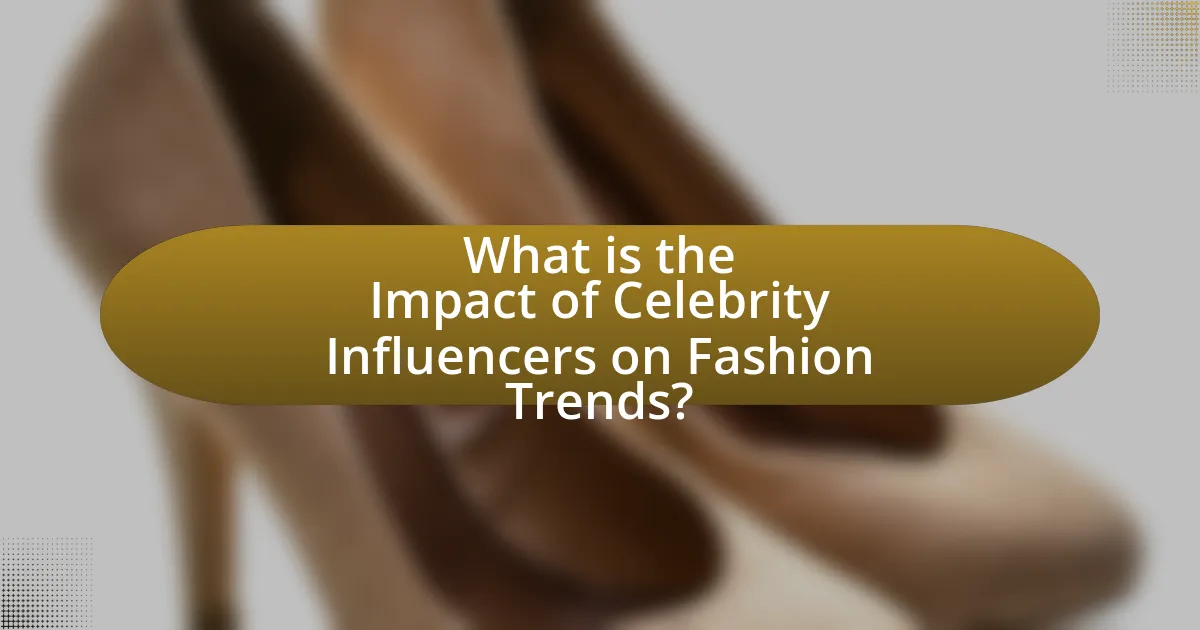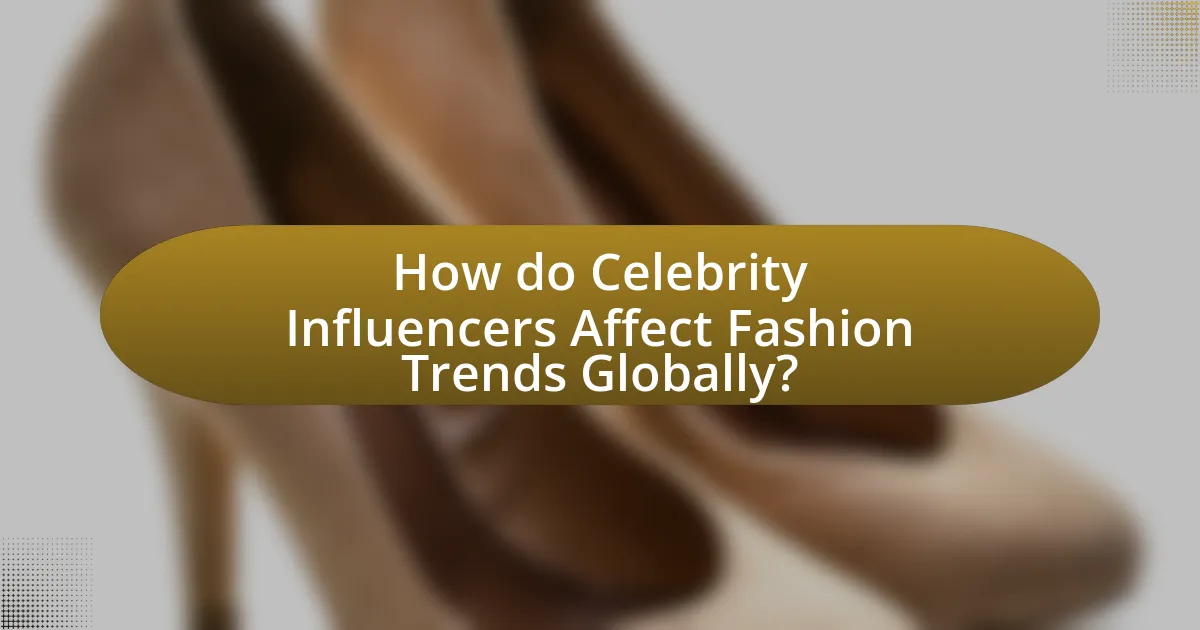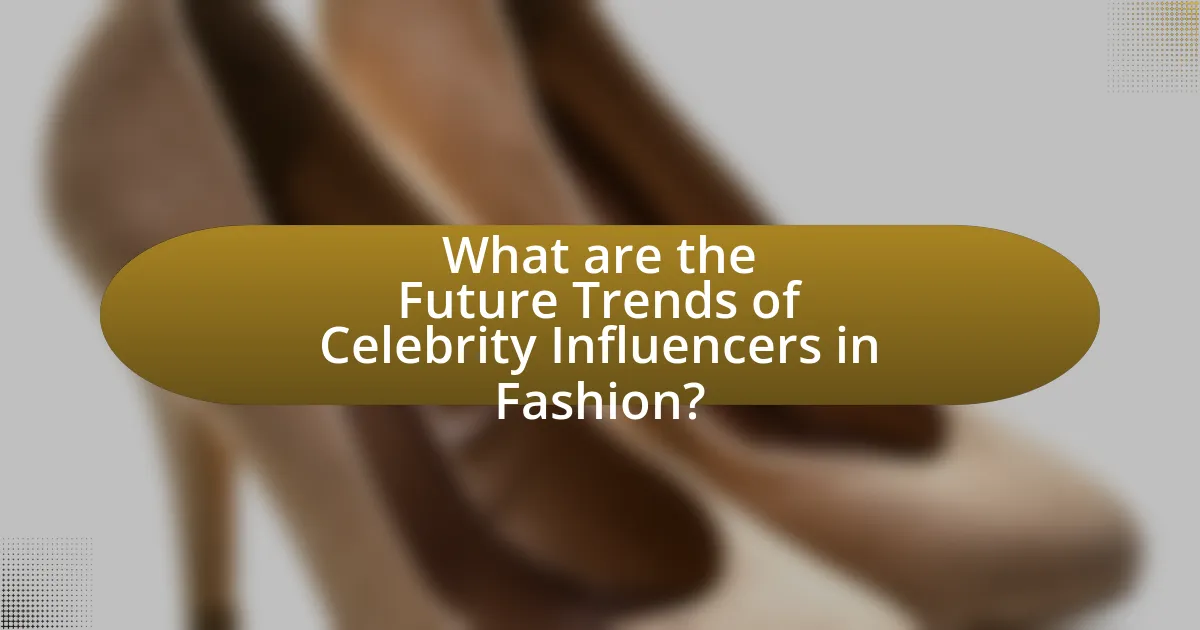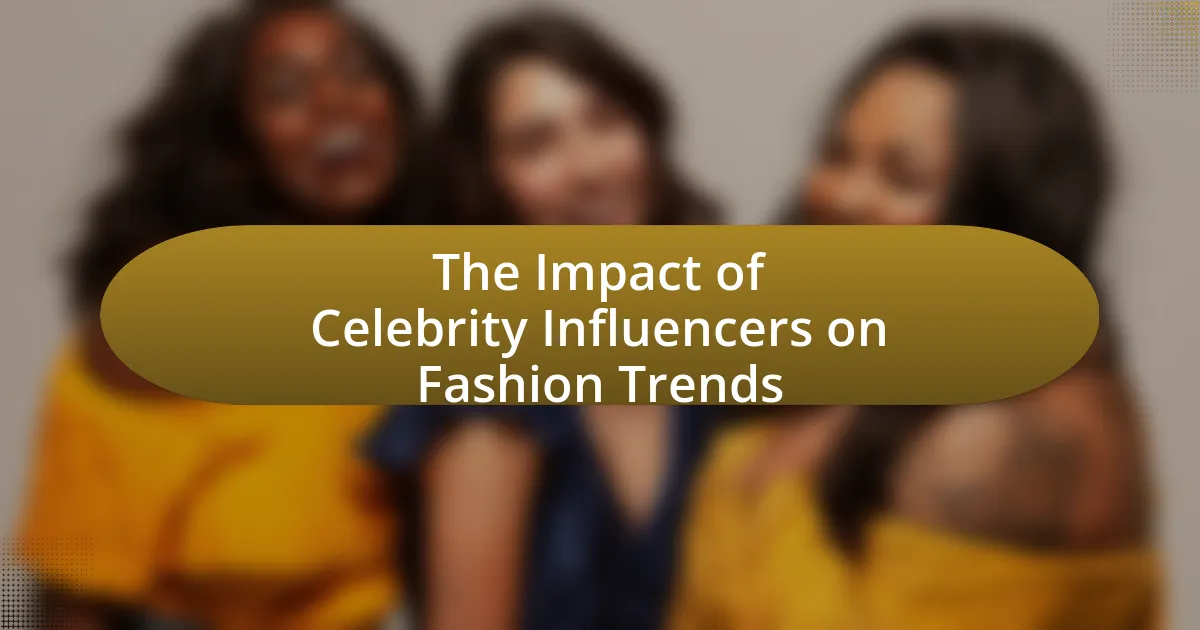Celebrity influencers play a pivotal role in shaping fashion trends by utilizing their visibility and social media platforms to promote specific styles and brands. Research indicates that a significant percentage of consumers, particularly millennials, are influenced by celebrity endorsements when making fashion purchases. The article explores how these influencers affect consumer behavior, the psychological factors driving this influence, and the impact of social media in amplifying their reach. It also examines the financial implications of celebrity endorsements for fashion brands, the characteristics that make certain celebrities more influential, and the environmental concerns associated with fast fashion driven by celebrity trends. Additionally, the article discusses future trends in celebrity influence, including sustainability and technological advancements in fashion marketing.

What is the Impact of Celebrity Influencers on Fashion Trends?
Celebrity influencers significantly shape fashion trends by leveraging their visibility and social media platforms to promote specific styles and brands. Their endorsements often lead to increased consumer interest and sales, as seen in the 2019 study by the Journal of Fashion Marketing and Management, which found that 70% of young consumers are influenced by celebrity endorsements when making fashion purchases. This influence is further amplified by the rapid dissemination of trends through platforms like Instagram and TikTok, where celebrities showcase their outfits, creating immediate demand for similar items among their followers.
How do celebrity influencers shape consumer behavior in fashion?
Celebrity influencers significantly shape consumer behavior in fashion by leveraging their visibility and credibility to drive trends and purchasing decisions. Their endorsements often create a sense of aspiration and desirability around specific brands or styles, leading consumers to emulate their fashion choices. Research indicates that 70% of millennials are influenced by celebrity endorsements when making fashion purchases, highlighting the substantial impact these figures have on consumer preferences. Additionally, platforms like Instagram and TikTok amplify their reach, allowing influencers to showcase outfits and styles to millions, further reinforcing trends and encouraging immediate consumer action.
What psychological factors drive consumers to follow celebrity fashion trends?
Consumers are driven to follow celebrity fashion trends primarily due to social influence, aspirational identification, and the desire for social validation. Social influence occurs as individuals observe and emulate the behaviors and styles of celebrities, perceiving them as trendsetters. Aspirational identification arises when consumers aspire to the lifestyle and status associated with celebrities, motivating them to adopt similar fashion choices. The desire for social validation is evident as consumers seek approval from peers by aligning their fashion sense with that of admired public figures. Research indicates that 70% of consumers are influenced by celebrity endorsements, highlighting the significant impact of these psychological factors on consumer behavior in fashion.
How does social media amplify the influence of celebrity fashion choices?
Social media amplifies the influence of celebrity fashion choices by providing a platform for immediate and widespread dissemination of their styles. Celebrities share their outfits through posts, stories, and live streams, reaching millions of followers instantly. For instance, a study by the Pew Research Center found that 72% of adults use social media, allowing celebrities to connect directly with their audience and showcase their fashion choices in real-time. This direct engagement fosters a sense of intimacy and relatability, encouraging fans to emulate their styles. Additionally, social media algorithms prioritize trending content, further elevating the visibility of celebrity fashion, as seen when a celebrity’s outfit goes viral, leading to increased searches and sales of similar items.
What role do celebrity endorsements play in fashion marketing?
Celebrity endorsements play a crucial role in fashion marketing by significantly influencing consumer purchasing decisions and brand perception. When a celebrity endorses a fashion brand, they leverage their popularity and credibility to attract attention and create a sense of aspiration among consumers. Research indicates that 49% of consumers are more likely to purchase a product endorsed by a celebrity, as their association with the brand enhances its visibility and desirability. Furthermore, celebrity endorsements can lead to increased sales, with brands experiencing up to a 20% rise in revenue following a high-profile endorsement campaign. This demonstrates the powerful impact that celebrity influencers have on shaping fashion trends and driving consumer behavior.
How do endorsements affect brand perception among consumers?
Endorsements significantly enhance brand perception among consumers by leveraging the credibility and popularity of the endorsers. When a well-known celebrity endorses a brand, it often leads to increased trust and positive associations, as consumers tend to view the brand more favorably due to the celebrity’s influence. Research indicates that 70% of consumers are more likely to purchase a product when it is endorsed by a celebrity they admire, demonstrating the direct correlation between endorsements and consumer behavior. This effect is particularly pronounced in the fashion industry, where brand image is crucial, and endorsements can elevate a brand’s status and desirability.
What are the financial implications of celebrity endorsements for fashion brands?
Celebrity endorsements significantly enhance the financial performance of fashion brands by increasing brand visibility and driving sales. Research indicates that brands that utilize celebrity endorsements can experience a sales increase of up to 20% following a campaign launch. For instance, a study by the Journal of Advertising Research found that 70% of consumers are more likely to purchase a product endorsed by a celebrity they admire. Additionally, celebrity endorsements can lead to higher brand equity, as they often create a perception of quality and desirability, which can translate into premium pricing strategies. This financial impact is further evidenced by the fact that brands like Calvin Klein and Gucci have reported substantial revenue growth linked directly to their celebrity partnerships.
Why are certain celebrities more influential in fashion than others?
Certain celebrities are more influential in fashion than others due to their cultural relevance, social media presence, and collaborations with fashion brands. Cultural relevance allows these celebrities to resonate with current trends and societal values, making their fashion choices more impactful. For instance, celebrities like Rihanna and Beyoncé have successfully shaped fashion trends by aligning their personal styles with broader cultural movements, such as body positivity and inclusivity.
Additionally, a strong social media presence amplifies their influence; for example, Kim Kardashian’s millions of followers on platforms like Instagram enable her to set trends that quickly gain traction. Collaborations with high-profile fashion brands, such as Rihanna’s Fenty line with LVMH, further solidify their status as fashion icons, as these partnerships often lead to innovative designs that capture public attention. Thus, the combination of cultural relevance, social media reach, and strategic brand collaborations establishes why certain celebrities wield greater influence in the fashion industry.
What characteristics make a celebrity a fashion icon?
A celebrity becomes a fashion icon through a combination of unique style, influence on trends, and consistent public presence. Unique style refers to the ability to create and embody a distinctive aesthetic that resonates with audiences, often setting trends rather than following them. Influence on trends is evidenced by the celebrity’s ability to inspire fashion choices among fans and designers alike, often leading to increased visibility for certain styles or brands. Consistent public presence, including appearances at high-profile events and collaborations with fashion brands, reinforces their status and keeps them relevant in the fashion conversation. For example, celebrities like Rihanna and Harry Styles have been recognized for their innovative fashion choices and significant impact on contemporary trends, demonstrating these characteristics effectively.
How does a celebrity’s personal brand impact their influence on fashion trends?
A celebrity’s personal brand significantly impacts their influence on fashion trends by shaping public perception and consumer behavior. When a celebrity cultivates a strong personal brand, characterized by distinct style, values, and lifestyle, they create a relatable image that resonates with their audience. This connection often leads fans to emulate their fashion choices, driving trends in the industry. For instance, when celebrities like Rihanna or Kim Kardashian showcase specific styles or brands, their followers are more likely to adopt similar looks, as evidenced by the rapid rise in popularity of brands they endorse. Research indicates that 70% of consumers are influenced by celebrity endorsements, highlighting the effectiveness of personal branding in shaping fashion trends.

How do Celebrity Influencers Affect Fashion Trends Globally?
Celebrity influencers significantly shape global fashion trends by leveraging their vast social media reach and cultural impact. Their endorsements and personal style choices often lead to increased visibility for specific brands and styles, driving consumer interest and sales. For instance, a study by the Journal of Fashion Marketing and Management found that 70% of consumers are influenced by celebrity endorsements when making fashion purchases. This demonstrates that celebrity influencers not only set trends but also directly affect consumer behavior and market dynamics in the fashion industry.
What are the differences in fashion influence across cultures?
Fashion influence varies significantly across cultures due to differing historical contexts, social norms, and values. For instance, Western cultures often prioritize individualism and self-expression in fashion, leading to trends that emphasize personal style and celebrity endorsements, such as the influence of figures like Kim Kardashian or Rihanna. In contrast, many Asian cultures may emphasize collectivism and tradition, where fashion is often influenced by cultural heritage and community values, as seen in the popularity of traditional garments like the kimono in Japan or the cheongsam in China. Additionally, the rise of global communication has led to a blending of these influences, but local customs still play a crucial role in shaping fashion trends, as evidenced by the unique adaptations of global styles to fit local tastes and practices.
How do local celebrities impact fashion trends in their regions?
Local celebrities significantly influence fashion trends in their regions by setting styles that resonate with their communities. Their visibility in media and social platforms allows them to showcase specific clothing, accessories, and aesthetics, which often leads to increased demand for those items among local consumers. For instance, a study by the Fashion Institute of Technology found that 70% of consumers reported being influenced by local celebrities when making fashion purchases. This demonstrates that local figures not only inspire trends but also drive sales and shape the fashion landscape in their areas.
What global fashion trends have emerged from celebrity influence?
Celebrity influence has led to the emergence of several global fashion trends, including athleisure, oversized silhouettes, and sustainable fashion. Athleisure, characterized by the blending of athletic wear with casual clothing, gained popularity through celebrities like Kim Kardashian and Rihanna, who showcased stylish yet comfortable outfits. Oversized silhouettes became a trend as stars such as Billie Eilish embraced baggy clothing, challenging traditional body image standards and promoting comfort. Additionally, the rise of sustainable fashion has been significantly driven by celebrities like Emma Watson and Leonardo DiCaprio, who advocate for eco-friendly brands and practices, influencing consumer behavior towards more sustainable choices. These trends illustrate how celebrity endorsements and personal styles can shape and redefine global fashion landscapes.
How do celebrity influencers contribute to the rise of fast fashion?
Celebrity influencers significantly contribute to the rise of fast fashion by promoting trends and brands through their social media platforms. Their large followings create immediate visibility for new styles, leading to increased consumer demand. For instance, a study by the Journal of Fashion Marketing and Management found that 70% of young consumers are influenced by celebrities when making fashion purchases. This rapid endorsement cycle encourages fast fashion brands to produce clothing quickly and at lower costs to meet the heightened demand, further fueling the industry’s growth.
What are the environmental implications of fast fashion driven by celebrity trends?
Fast fashion driven by celebrity trends has significant environmental implications, primarily due to increased waste and resource consumption. The rapid production cycles associated with fast fashion lead to an estimated 92 million tons of textile waste generated annually, as consumers frequently discard items after minimal use. Additionally, the fashion industry is responsible for about 10% of global carbon emissions, largely due to the energy-intensive processes involved in manufacturing and transporting clothing. The use of synthetic materials, which are prevalent in fast fashion, further exacerbates environmental issues, as they contribute to microplastic pollution in oceans and waterways. These factors collectively highlight the detrimental impact of celebrity-driven fast fashion on the environment.
How do consumers perceive the sustainability of celebrity-endorsed fashion brands?
Consumers generally perceive the sustainability of celebrity-endorsed fashion brands as being influenced by the celebrity’s personal commitment to environmental issues and the transparency of the brand’s practices. Research indicates that when celebrities actively promote sustainable practices or align with eco-friendly brands, consumers are more likely to view those brands as credible and responsible. For instance, a study published in the Journal of Business Research found that consumers are more inclined to trust and support brands endorsed by celebrities who demonstrate genuine engagement in sustainability initiatives, such as using recycled materials or ethical labor practices. This perception is further reinforced by the growing trend of consumers seeking authenticity and accountability in fashion, leading them to favor brands that not only showcase sustainable practices but also have celebrities who embody those values.

What are the Future Trends of Celebrity Influencers in Fashion?
The future trends of celebrity influencers in fashion will increasingly focus on sustainability, personalization, and digital engagement. As consumers become more environmentally conscious, celebrity influencers are likely to promote sustainable fashion brands and practices, reflecting a shift towards eco-friendly choices. Additionally, the rise of artificial intelligence and data analytics will enable influencers to offer personalized fashion recommendations, enhancing consumer engagement. Furthermore, the integration of augmented reality and virtual reality in social media platforms will allow influencers to create immersive shopping experiences, driving sales and brand loyalty. These trends are supported by research indicating that 70% of consumers prefer brands that demonstrate sustainability, and 60% are more likely to purchase from brands that offer personalized experiences.
How is technology changing the way celebrities influence fashion?
Technology is transforming how celebrities influence fashion by enabling real-time engagement and direct communication with their audiences. Social media platforms like Instagram and TikTok allow celebrities to showcase their outfits instantly, creating immediate trends that can go viral. For instance, a study by the Journal of Fashion Marketing and Management found that 70% of consumers are influenced by celebrity endorsements on social media, highlighting the significant impact of these platforms. Additionally, augmented reality (AR) and virtual reality (VR) technologies are allowing fans to virtually try on clothing worn by celebrities, further enhancing their influence on fashion choices.
What role do virtual influencers play in the future of fashion trends?
Virtual influencers are poised to significantly shape the future of fashion trends by leveraging their digital presence to engage audiences and promote brands. These computer-generated personas can be tailored to reflect specific aesthetics and values, allowing brands to create targeted marketing strategies that resonate with diverse consumer segments. For instance, the rise of virtual influencers like Lil Miquela has demonstrated their ability to amass large followings and drive engagement, with her Instagram account boasting over 3 million followers. This level of influence can lead to increased brand visibility and sales, as virtual influencers often collaborate with fashion labels to showcase collections in innovative ways. Additionally, their ability to operate 24/7 without the constraints of physical appearances or schedules allows for continuous brand promotion and interaction with consumers, further solidifying their role in the evolving landscape of fashion marketing.
How might augmented reality impact celebrity fashion marketing?
Augmented reality (AR) can significantly enhance celebrity fashion marketing by providing immersive experiences that engage consumers more effectively. AR allows fans to virtually try on clothing and accessories endorsed by celebrities, creating a personalized shopping experience that can increase conversion rates. For instance, brands like Gucci and Dior have utilized AR in their marketing campaigns, leading to higher customer interaction and sales. According to a study by the Harvard Business Review, companies that integrate AR into their marketing strategies can see a 20% increase in customer engagement, demonstrating the effectiveness of this technology in the fashion industry.
What strategies can brands use to leverage celebrity influence effectively?
Brands can leverage celebrity influence effectively by aligning their marketing strategies with the celebrity’s personal brand and audience. This alignment ensures authenticity, as consumers are more likely to trust endorsements that feel genuine. For instance, a study by the Journal of Advertising Research found that 70% of consumers are more likely to purchase a product endorsed by a celebrity they admire. Additionally, brands can utilize social media platforms to amplify the reach of celebrity endorsements, as these platforms allow for direct engagement with the audience. Collaborating on exclusive product lines or limited editions can also create a sense of urgency and desirability, further enhancing the brand’s appeal.
How can brands ensure authenticity in their partnerships with celebrity influencers?
Brands can ensure authenticity in their partnerships with celebrity influencers by selecting influencers whose values and audience align closely with their brand identity. This alignment fosters genuine connections, as consumers are more likely to trust endorsements that feel natural and relatable. Research indicates that 61% of consumers trust influencer recommendations, particularly when the influencer has a history of authentic engagement with their audience. Additionally, brands should encourage influencers to share personal stories or experiences related to the product, enhancing credibility. By prioritizing transparency and allowing influencers creative freedom, brands can cultivate a more authentic partnership that resonates with consumers.
What best practices should brands follow when collaborating with celebrities?
Brands should ensure alignment between their values and the celebrity’s image when collaborating. This alignment fosters authenticity, which is crucial for consumer trust and engagement. For instance, a study by the Journal of Advertising Research found that brand credibility significantly increases when there is a perceived fit between the celebrity and the brand, leading to higher purchase intentions. Additionally, brands should establish clear communication and expectations regarding the collaboration to avoid misunderstandings and ensure that the campaign resonates with the target audience. Engaging in thorough research about the celebrity’s audience demographics can also enhance the effectiveness of the collaboration, as it allows brands to tailor their messaging appropriately.
What are the potential pitfalls of relying on celebrity influencers in fashion?
Relying on celebrity influencers in fashion can lead to several potential pitfalls, including authenticity issues, market oversaturation, and misalignment with brand values. Authenticity concerns arise when consumers perceive celebrity endorsements as insincere, which can diminish trust in both the influencer and the brand. For instance, a study by the Journal of Advertising Research found that 61% of consumers are less likely to trust a brand if they believe the influencer is not genuinely interested in the product. Market oversaturation occurs when numerous brands engage the same celebrity, diluting their unique appeal and making it harder for individual brands to stand out. Additionally, misalignment with brand values can alienate target audiences; for example, if a luxury brand partners with a celebrity known for controversial behavior, it may negatively impact the brand’s image and consumer perception.
How can brands mitigate risks associated with celebrity endorsements?
Brands can mitigate risks associated with celebrity endorsements by conducting thorough due diligence on the celebrity’s public image and past behavior. This involves analyzing the celebrity’s social media presence, previous endorsements, and any controversies that may affect brand reputation. For instance, a study by the Journal of Advertising Research found that brands that align with celebrities who have a positive public perception experience a 20% increase in consumer trust. Additionally, brands can implement contractual clauses that allow for termination of the endorsement agreement in case of negative publicity or behavior from the celebrity. This proactive approach helps protect the brand’s image and ensures alignment with consumer values.
What lessons can be learned from failed celebrity fashion collaborations?
Failed celebrity fashion collaborations teach several important lessons about brand alignment, market research, and consumer engagement. Firstly, successful collaborations require a strong alignment between the celebrity’s personal brand and the fashion brand’s identity; mismatches can lead to consumer confusion and rejection, as seen in the case of the collaboration between Kanye West and the brand A.P.C., which faced criticism for not reflecting West’s established aesthetic. Secondly, thorough market research is crucial; understanding the target audience’s preferences can prevent missteps, as demonstrated by the backlash against the collaboration between Rihanna and River Island, where the designs did not resonate with the expected demographic. Lastly, effective consumer engagement and communication are vital; when the collaboration between Jennifer Lopez and Kohl’s failed to generate excitement, it highlighted the importance of creating a narrative that resonates with fans. These lessons emphasize the need for strategic planning and alignment in celebrity fashion partnerships to achieve success.

Leave a Reply